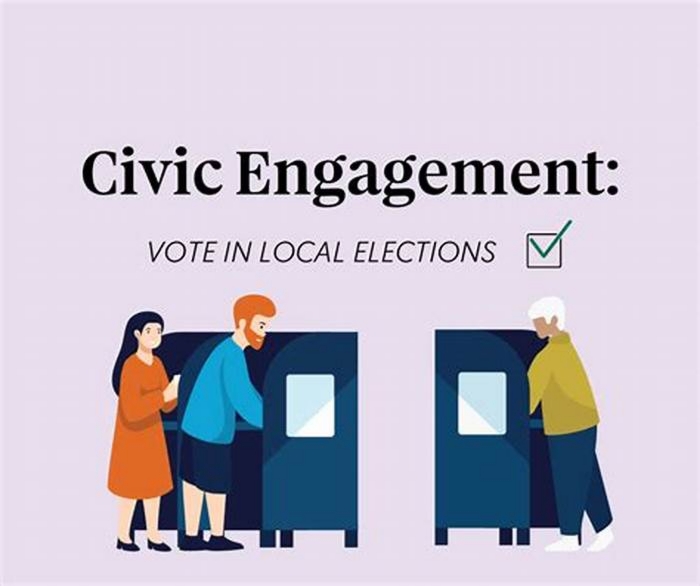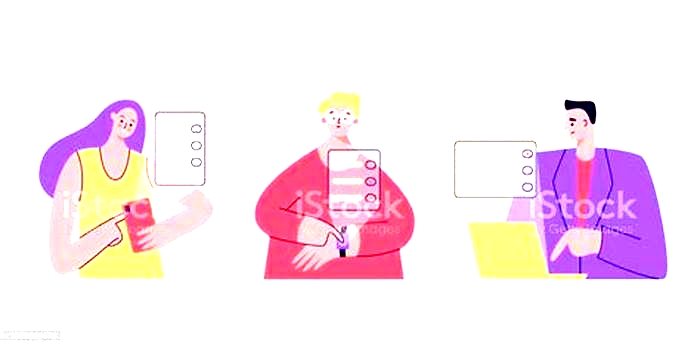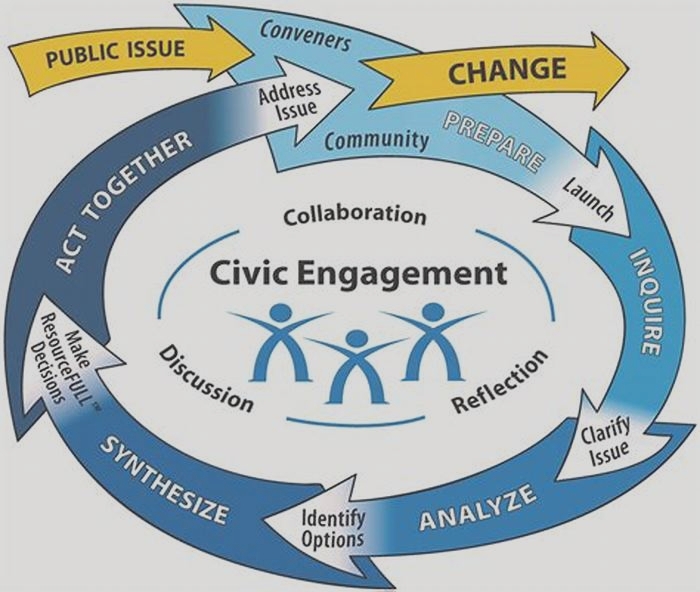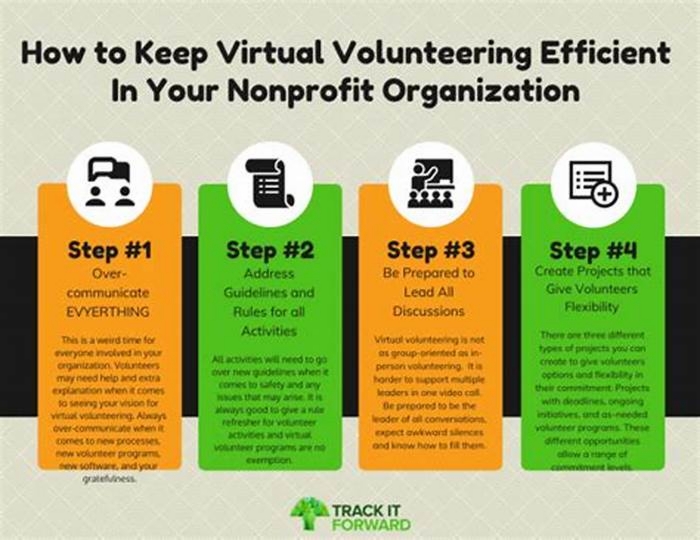How to Leverage Your Smartwatch s Civic Engagement Features to Vote in Local Elections if applicable in your region

The bucket list for involved citizens: 76 things you can do to boost civic engagement
Are we living up to the responsibility?
The mix of dysfunctional politics and lack of emphasis on civic education has, among other things, led many Americans to be highly skeptical about the very foundations of our democratic form of government. In the 1960s, amid civil rights protests and the Vietnam war, Americans were deeply divided politically, but according to the Pew Research Center, the vast majorityalmost 80 percenttrusted the government to do the right thing always or most of the time. Today, less than 20 percent of the American public trusts the government. And for many young people, the idea of self-government is no longer sacrosanct. Almost one in four Americans thinks a dictator, namely a strong leader that doesnt have to deal with Congress or elections, could be a good way to run our country.
The founding fathers would be deeply concerned about our state of affairs. Having just fought for independence from England, and deeply fearful of strong leaders like kings, they would be dismayed at the idea of removing power from the Congress to strengthen the presidency. They were fearful of placing too much power in any one branch of government. Protecting the rights of the minority as well as the majority would be infringed upon if power was not given to the Peoples House, as the House of Representatives is commonly referred to.
But what can we do?
It isnt too complicated. Civic engagement is the glue that holds self-government together. Yet civic participation and engagement has been on the decline for several decades. Therefore, each and every one of us must be as active and involved in our community and country as possible. Self-government is hard work and requires effort. Action is essential to maintaining the foundations of our democracy, no matter which political party happens to be in power.
To be a truly involved citizen, we must reconnect with our founding documents. We must learn and practice the skills of civic participation beginning with voting and moving onto legislating, speaking out, and building coalitions to solve problems on the local, state, and federal levels.
Remember 1776 and consider 76 ways to stay civically engaged
While by no means comprehensive, the Democracy 76 list below provides specific and practical actions that we all can take to be an involved citizen. The list is broken into five actions that are essential components for engagement. It is expressly free from politics and partisanship and should be undertaken by all Americansregardless of political perspectives or affiliation.
The list was generated drawing on the National Conference on Citizenships Civic Health Index and on a wide range of input from individuals dedicated to fostering improved civic engagement, including colleagues from the American Enterprise Institute, Arizona State University, CivXNow, Education International, DigCitCommit, Facing History and Ourselves, National Conference on Citizenship, National Council for the Social Studies, Ronald Reagan Presidential Foundation and Institute, University of Illinois Urbana-Champaign, and University of Virginias Center for Politics. While we are grateful for everyones rich contributions, the list is ours and any mistakes within it are ours alone.
Finally, this list has contributed to the call to action of the newly launched Purple Project for Democracy, which has as its central mission to create a more active, engaged American citizenry, ultimately strengthening the very foundations of our democratic form of government. This is certainly something the founding fathers would support.
The Democracy 76 checklist
Stay informed
1. Read and subscribe to daily local, regional, or national newspapers. Check out Allsides.com for news from conservative, liberal, and centrist points of view.2. Facts matter: Is your news source trustworthy? Check out these non-partisan, nonprofits: factcheck.org and University of Virginias Center for Politics Youth Leadership Initiatives media literacy tips.3. Fill your pocket with democracy. Pick up pocket-sized constitutions for as little as $1.4. Get the facts on any politician or political candidate at the nonpartisan Votesmart.org.5. Talk with someone who doesnt share your political views. BetterAngels.org is helping people do this all across the country.6. Attend a discussion or event in your community or school about an issue you want to know more about.7. Shadow a public servant for the day to learn how our institutions work.8. Visit a museum. Learn about local, regional, and national history, and about those who have taken civic action in the past.9. Visit a library. Librarians can point you to important books on our American democracy.10. Deep dive into the constitution. The National Constitution Center has an interactive line-by-line breakdown.11. Use a highlighter when reading news articles to note points of interest, subjects that you agree/disagree with, or questions that you would like to know more about.
Vote
12. Vote: Local, state, and national elections matter! Find out when elections are happening from U.S. Vote Foundation.13. Make sure youre registered to vote at Vote.gov or use Turbovote.org for quick and easy registration.14. Make a voting pact with your friends or family. Collectively commit to register and vote. Remind each other regularly. Make a plan to go to the polls together!15. Volunteer to register voters. League of Women Voters in your area is a great resource for running voter registration drives.16. If you are a boss, give your employees time off to vote. If you are an employee, ask your boss to consider this.17. Volunteer to work at a polling place. To find out how, go to the Election Assistance Commissions website or contact your local registrar.18. Offer to drive elderly voters or those without transportation to the polls.19. If you own a business, offer discounts to people who provide proof of voting on election days. If you work at a business, ask your boss to consider this.20. Prepare to vote by checking ahead of time what is on the ballot, your polling place, and what you need to bring. Many states require identification such as a license or passport.21. If you are voting by absentee ballot, pay attention to deadlines and follow all the steps in the instructions.22. Mark the date when voter registration ends on the calendar along with the dates for each election. Leave time in the day for getting to the polls.
Participate
23. Communicate with your elected officials to share your views on issues you care about. A letter, phone call, or visit are still the best ways to contact them.24. Write an op-ed or letter to an editor.25. Attend a city council or community board meeting. The National League of Cities can help describe its function.26. Advocate for civic education in schools. Not all states require it, and you can join the CivXNow campaign to push for it.27. Join a political campaign. Volunteer for your preferred candidate.28. Become an ambassador supporting digital citizenship education by signing up with DigCitConnect.29. Join the Parent-Teacher Association at your local school.30. Get involved with the local school board. The National School Boards Association has good tips on how to engage.31. Join a political party. Here is a list of all the political parties, what they stand for, and how to get involved.32. Run for office. If you dont like the candidates you are choosing from, put on your shoes and run for office.
Build community
33. Identify a problem in your community and work with your neighbors to fix it. Neighborhood street sweeps and playground refurbishment are just two examples.34. Plant a tree or garden in your community.35. Share the #WeThePurple Teacher Toolkit with teachers in your community for good ideas on civic engagement activities for young people.36. Volunteer to serve as an officer or member of a group in your community. Volunteer Match can help you connect to groups in your area.37. Visit someone elses place of worship.38. Keep watch on children who play in your neighborhood.39. Paint a mural in a public space (with permission).40. Pick up trash in your or someone elses neighborhood.41. Start a book club and invite your neighbors to participate.42. Serve as a juror. If you are called for duty, remember our judicial system cant work without citizen jurors.43. Collect food for those in need.44. Visit a nursing home or hospital.45. Donate blood or plasma.46. Take a first aid class. The American Red Cross can help prepare you to help those in need.47. Clean up the local park.48. Clean up a local river or lake.49. Start a bowling league or another activity that you enjoy that might bring people together.50. Help others in an emergency.51. If you own a gun, participate in a gun safety course.52. Host or be an exchange student. Rotary Youth Exchange is a good place to begin.53. Shop local and support small businesses.54. Contribute financially to a cause, even $5 can help. Charity Watch is a good place to start if you need help identifying organizations to support.55. Support the teachers at your local school. Ask how you can help and consider starting with supporting classroom projects through DonorsChoose.org.56. Volunteer at a museum.57. Volunteer at a public library.58. Volunteer at a pantry, soup kitchen, or food bank.59. Volunteer at a community garden.60. Volunteer to coach a youth sports team.61. Volunteer to lead a youth group.62. Volunteer at a community center.63. Volunteer to help veterans. The USO is a good place to start.64. Volunteer to help teachers. Chaperone school trips to the local city hall and share your experiences engaging with your community and government.65. Do a year of service. Serviceyear.org can help you connect to thousands of opportunities to develop real-world skills while giving back to your community.66. Choose to work at a nonprofit organization dedicated to helping others.67. Become a substitute teacher.
Get social
68. Host or attend a debate watch party in your community or university.69. Host a Purple Conversation with family, friends, or in your school or community to discuss ways to foster civic engagement. Use the tips on facilitating open dialogue from Living Room Conversations.70. Follow and like #WeThePurple across social media.71. Host a picnic or block party in your neighborhood and (respectfully) talk about your views.72. Use your consumer power to support companies whose values you believe in.73. Go out and talk to people, use your hands, and your time.74. Invite friends and neighbors to watch a documentary on a topic affecting your community.75. Use your social media accounts to post uplifting information relevant to making our society more civil. The University of Virginia has a helpful guide on civil discourse when talking about politics.76. Recruit a friend and start checking off items in the Democracy 76 checklist together!
Register to vote
All states except North Dakota require that you register before voting in an election. Select your state or territory from the dropdown menu to find the rules that apply to you.
U.S. citizens living outside the U.S., including U.S. service members and their families, can register to vote and request an absentee ballot by completing the Federal Post Card Application (FPCA). U.S. military family members, like everyone else, must meet U.S. voter eligibility requirements to register and request a ballot. For more information, visit the Federal Voter Assistance Program.
There is no national voter registration deadline. Voters in each state and territory must follow their voter registration laws. Select your state or territory from the dropdown menu to find your voter registration deadline.
Every state except North Dakota requires citizens to register if they want to vote. Some states require voters to register up to 30 days before an election, while others allow registration up to and on Election Day. Its important you know the rules in your state.
Select your state or territory from the dropdown menu to check your registration before your states deadline. That could be up to 30 days before the election.
Also check to see if your registration is marked inactive. You may become inactive if you did not vote in at least two federal elections and did not respond when election officials tried to reach you.
An inactive status does not necessarily mean that you need to re-register. It means that you may have to take extra steps before you can vote. Your state election officials office or your local election office can help you move your registration status back to active or answer questions you may have.
Make sure you are registered with the correct name, address, and political party affiliation. Visit your states registration page for information on how to update your voter registration information.
Whether youve moved near or far, you need to update your voter registration after a change of address. Select your state or territory from the dropdown menu to learn how to register online or by mail. If your state has online voter registration, that may be the quickest way to make changes. Submit your changes before your states registration deadline, which can be up to 30 days before Election Day. Your state may also require a new drivers license or ID card. See what type of voter ID your state requires.
Moving within your state
Even if you move within your same state, youll need to update your registration with your new address.
Moving to another state
Register before your new states deadline, which may be up to 30 days before the election. If you do not have time to register in your new state before Election Day, your old state may allow you to vote by mail or in person. For presidential election years, your old state must allow you to vote by mail or in person. After that, youll need to register in your new state.
Moving abroad
U.S. citizens living outside the U.S. can register to vote and request an absentee ballot by completing the Federal Post Card Application (FPCA). See the Federal Voting Assistance Program (FVAP) for more resources on military and overseas voting.
Each state has a different process to select or change your party affiliation. Depending on your state, you may be asked for your party affiliation when you register to vote. Your state may not have political party affiliations for voters. Contact your state or local election office to see what the procedure is and if there are any deadlines for where you live. Selecting a party affiliation is not available in all states.
Regardless of which party you choose, the voting process is the same in a general election, which is when candidates are elected to offices. Your party affiliation impacts who you can vote for in primary elections and caucuses.
When you register to vote, youll be sent a voter registration card. This card confirms that you are registered and ready to vote. Your voter registration card typically includes your name, your home address, and the address of the polling station where youll vote. You can also look up your voter registration using your states voter registration lookup tool online.
If your name or address changes, you will need to update your voter registration. Once youve updated your voter registration information, you may receive a new voter registration card, depending on your state. If you have questions, your local election office is the best resource to help.
You do not usually need to have your voter registration card with you in order to vote, but you may need to present another form of ID to vote. Learn more about voter registration.








